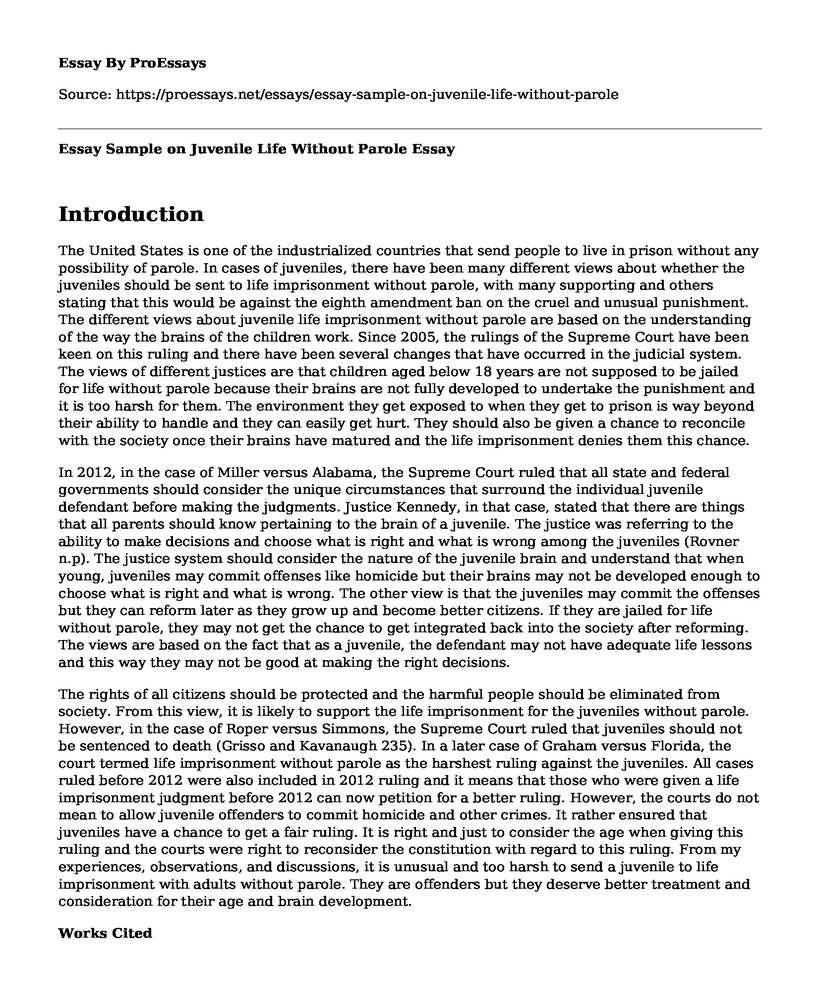Introduction
The United States is one of the industrialized countries that send people to live in prison without any possibility of parole. In cases of juveniles, there have been many different views about whether the juveniles should be sent to life imprisonment without parole, with many supporting and others stating that this would be against the eighth amendment ban on the cruel and unusual punishment. The different views about juvenile life imprisonment without parole are based on the understanding of the way the brains of the children work. Since 2005, the rulings of the Supreme Court have been keen on this ruling and there have been several changes that have occurred in the judicial system. The views of different justices are that children aged below 18 years are not supposed to be jailed for life without parole because their brains are not fully developed to undertake the punishment and it is too harsh for them. The environment they get exposed to when they get to prison is way beyond their ability to handle and they can easily get hurt. They should also be given a chance to reconcile with the society once their brains have matured and the life imprisonment denies them this chance.
In 2012, in the case of Miller versus Alabama, the Supreme Court ruled that all state and federal governments should consider the unique circumstances that surround the individual juvenile defendant before making the judgments. Justice Kennedy, in that case, stated that there are things that all parents should know pertaining to the brain of a juvenile. The justice was referring to the ability to make decisions and choose what is right and what is wrong among the juveniles (Rovner n.p). The justice system should consider the nature of the juvenile brain and understand that when young, juveniles may commit offenses like homicide but their brains may not be developed enough to choose what is right and what is wrong. The other view is that the juveniles may commit the offenses but they can reform later as they grow up and become better citizens. If they are jailed for life without parole, they may not get the chance to get integrated back into the society after reforming. The views are based on the fact that as a juvenile, the defendant may not have adequate life lessons and this way they may not be good at making the right decisions.
The rights of all citizens should be protected and the harmful people should be eliminated from society. From this view, it is likely to support the life imprisonment for the juveniles without parole. However, in the case of Roper versus Simmons, the Supreme Court ruled that juveniles should not be sentenced to death (Grisso and Kavanaugh 235). In a later case of Graham versus Florida, the court termed life imprisonment without parole as the harshest ruling against the juveniles. All cases ruled before 2012 were also included in 2012 ruling and it means that those who were given a life imprisonment judgment before 2012 can now petition for a better ruling. However, the courts do not mean to allow juvenile offenders to commit homicide and other crimes. It rather ensured that juveniles have a chance to get a fair ruling. It is right and just to consider the age when giving this ruling and the courts were right to reconsider the constitution with regard to this ruling. From my experiences, observations, and discussions, it is unusual and too harsh to send a juvenile to life imprisonment with adults without parole. They are offenders but they deserve better treatment and consideration for their age and brain development.
Works Cited
Grisso, Thomas, and Antoinette Kavanaugh. "Prospects for developmental evidence in juvenile sentencing based on Miller v. Alabama." Psychology, Public Policy, and Law 22.3 (2016): 235.
Rovner, Joshua. "Juvenile life without parole: An overview." Washington, DC: The Sentencing Project (2016).
Cite this page
Essay Sample on Juvenile Life Without Parole. (2022, Nov 04). Retrieved from https://proessays.net/essays/essay-sample-on-juvenile-life-without-parole
If you are the original author of this essay and no longer wish to have it published on the ProEssays website, please click below to request its removal:
- Ethos, Pathos, and Logos in 'Letter From Birmingham Jail' Essay
- Paper Example on Minors in the Legal System
- Paper Example on Health Disparities in the United States
- Essay Sample on The Growth of African Kingdoms
- Essay Example on Mexican-American War: A History of Conflict and Refuge
- Essay Example on Nina Simone's Impact on the Civil Rights Movement
- Paper Example on Defining Success: A Comparison of Western and Eastern Perspectives







